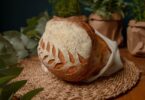Nikki Donadio
[mks_dropcap style=”letter” size=”52″ bg_color=”#ffffff” txt_color=”#000000″]I[/mks_dropcap]t was a girl who collapsed on the soccer field. Girl, I kept calling her, with her pink headband and red soccer uniform. Dead at thirty-seven, and wheeled into my emergency room with green grass stuck to her cleats. Thirty-seven, the same age as me.
Me and Dr. Yip found her husband pacing and rubbing the back of his hand against his cheeks. Dr. Yip told him he’s sorry, she’s dead, without the whole “we did everything we could.” Like rote my arms opened. I’m used to being the first person people fall into during these just-dead moments. The husband bawled into my scrubs, his snot soaking through to my tank top underneath. He breathed in this staggered, wind-sucking way that I’ve dealt with a hundred times before, a way that somehow breathed something into me.
Donna the social worker appeared and took over with her briefcase of brochures and supply of shitty cafeteria coffee. I gave the husband my best pat on the shoulder, met his eyes one last time, then returned to my patient.
The treatment room door squeaked shut behind me. Minutes ago the whole room was thick with noise: the orders Dr. Yip tried to make sound terse, shoes squeaking against the floor, monitors sounding off. But now the room with the just-dead girl was almost silent, and we were alone.
Bits of dirt fell to the floor as I pulled off her soccer cleats, Pumas, size eight. They were grass-stained and wrinkled like her knees, the toes almost worn through. I rolled down her red socks and peeled off her shin guards, sour from collecting years of sweat, a smell that was stunningly alive.
I removed the IV from the back of her left hand, comparing the look of her knuckles and nails to mine. My big hands and long fingers dwarfed her petite ones. Her fingertips paled while the rest of her started to turn purple.
I peeled the swatch of white athletic tape covering the gold stud earrings away from her earlobes. I know there’s a rule about taping over jewellery when playing but I don’t know what the point is. Imagine being stabbed with an earring playing soccer. Is it that big a deal considering the other risks like sprained ankles, shin splints, dehydration, cattiness, and apparently, sudden death?
Her soccer jersey was cut straight up the middle during a useless attempt at CPR, the logo for Stromboli’s Bakery with the smiley-face cartoon volcano chopped in two. I folded her jersey and packed it the white plastic bag. I folded her socks, too. The cleats went in last, tucked under the clothes. I wondered what people did with these bags and the stuff inside after I handed them over. Do they go through them, piece by piece, desperate for clues? Do they look for hairs or fingernails or some other small, once-alive piece of the person they have just lost? Do they hope the bag preserves their smell and so maybe they never even open it at all?
I usually sweep these kinds of moments into a pile in the corner of my mind and throw a tarp over them, like you would a pile of rusty junk on the front lawn of some derelict house. The just-deads have piled up there lately. It’s better to deal with them all at once, when I have a second. Otherwise, I would get nothing done.
After shift change I peeled out of my green scrubs and hid in the staff lounge, sitting at the table next to what the older nurses called the just-dead chair, its stuffingless cushion worn flat. It’s ugly and garbage but no one wants to get rid of it. The emergency department moved from the old main building of Blessed John Licci Hospital to the new wing last year and the just-dead chair was spared a trip to the dumpster, thanks to the efforts of the historical preservation committee made up of three veteran nurses who paid a construction worker in beer to rescue it from the garbage.
Sitting in the just-dead chair is supposed to mean you’re having a bad day. I’ve never sat in the chair, thinking I never had a bad enough day. And even if I did, whose business was it, anyway? What kind of a nurse comes to work and spends half her time bawling? Usually the same nurses who wore pink scrubs and whose patients were left unattended while they blew their noses in the staff lounge and performed a zippy sign of the cross while staring at the crucifix hanging above the sink.
I scrolled through the photos on my phone while I waited for Rhys to finish charting upstairs in the neurology clinic. I found a photo of us together at her birthday last year. As a sort of joke, I took her to the chicken wing joint that’s closed down now where they made her wear moose antlers and sang her happy birthday as she wiped barbeque sauce off her face onto a white bib. I remember her laughing the whole time, not put off that she was made to wear antlers and stand on a chair and be paid attention to about how old she was getting. I think she laughed all the way through forty-one.
Rhys came into the lounge like she always did, swift and adorable like a little fox. When we married last year she decided she didn’t like the term “partner,” but also didn’t like the patriarchal tone to “wife,” either, so I suggested we call each other “wife-friend,” which was maybe too cute, but it somehow stuck.
“Let’s go,” I said, tossing my bag over my shoulder. She gave me a doleful look. I looked away.
“I heard about the aneurysm. How sad.” She frowned as if the catastrophic CT scan was right in front of her, pointing at a black spot with her pen while breathing over the radiologist’s shoulder. I knew tonight she’d forget I’ve been a nurse for fifteen years and would try to remind me in her best smarty-pants doctor way all about the nature of brain aneurysms and how we had no hope of saving that girl’s life, that I was absolved because that girl’s biology was to blame and not me, in case I was confused about the situation.
We left Blessed John together as usual, steps apart, hands off each other. Rhys drove us home, stopping for ice cream. I waited in the car. She smiled and handed me a strawberry sundae. “You got the goriest ice cream for me?” I said. She licked her vanilla cone.
“Susie, I thought you enjoyed the gore,” she said. She hooked her free hand into mine and gave me a velvety look that made my insides soft. I tugged my hand away from Rhys’s despite the ache in my gut that almost allowed me to sink my head into her shoulder and soak her shirt through.
Despite washings and a dozen squirts of hand sanitizer, my fingers still felt gritty from the dirty cleats I’d taken off the just-dead girl’s feet. I showered as soon as I got home, clipping my fingernails down to soreness and scrubbing them until they throbbed. I didn’t bother blow-drying my hair, instead twisting it into a bun that, once released, would settle like helixes against my shoulders.
I opened the bathroom door. Rhys was standing by my keyboard, harassing me with her smile to play the Chopin I was working on at her insistence. She shuffled the sheet music around so the Chopin sat in front. I agreed to learn this piece in part because Muse had mixed this piece in on one of their songs. And also because she said it would be sooo romantic of me.
“Not now,” I said.
“I don’t care if you’re not ready. I just want to hear you play something.”
I put my headphones on and cranked up Zeppelin. Rhys sat at the kitchen table while I scrubbed in time to “When the Levee Breaks.” She didn’t even thumb through a magazine or look at her nails, but sat there and watched as I cleaned the sink and counters and insides of the kitchen cabinets until our condo reeked of vinegar. Sweat fell off my neck so I re-mopped, re-wiped, and re-showered. At one point Rhys got up to make herself jam on toast and left a strawberry fingerprint on the fridge door. I wiped it off.
“Susie, just leave it be.”
“Why? You want to live in this sporca place?”
“You know I don’t know what that means.”
“It means dirty. You know what it means.”
“Our home is far from dirty. The cleaning lady was just here—”
“Yeah yeah,” I said. I turned the music up louder. She pursed her lips and I watched her blue eyes turn navy from how pissed she was. She even crossed her arms. But she was too proper to raise her voice to me and she’d never have the balls to reach up and pull my headphones off even though if it were me I would. I would yank the damn things off her head and grab her shoulders and shout into her face for being such an asshole.
I stooped to wash the chair legs and when I stood back up she was gone, her black Nikes missing from the rack by the front door. It wasn’t weird of her to go running at night, especially in the summer. Especially since I had been a jerk. Rhys was the hottest thing post-run, eyes the bluest blue against the red of her cheeks. Sometimes she would come to bed all sweaty and her insides would be scorching and I loved touching her when she was like that, visceral, slick, heart still beating quick.
I washed the windows then. Our condo looks over the same ravine that Blessed John backs onto. Rhys said once the white streetlights hanging over the ravine’s fence made the leaves in the trees look like lacework. I didn’t see it but she did. I saw the leaves for what they were, veiny and alive but easy to pluck and even easier to tear up with my fingers.
An hour passed as I washed the windows, dusted the wainscoting, and vacuumed the cookie crumbs from between the couch cushions. Rhys was still out running as I washed ketchup freckles from the fridge shelf.
I called my older sister Cara at eleven. I let the phone ring and ring until finally I woke her and she answered “hello?” like someone just punched her in the gut.
“So, why do you guys need to wear tape over your earrings when you play?”
“What?”
“Soccer. The whole thing with the tape over the jewellery. What’s the point?”
“Susie, I don’t remember. I think it’s for safety,” Cara said. “This is really why you called me?”
“Do you think it makes any sense?”
“That you have a burning desire to know about soccer protocol at this hour? You hate sports.”
“Yeah, but will covering over earrings with tape really do anything to protect you?”
Cara sighed. I could see her on the other end, rubbing her eyes. “I guess so, or else the refs wouldn’t make players do it. Call me tomorrow?”
I called my younger sister Abby next. She answered half a ring in.
“What’s up?”
“You know how some girls wear tape over their earrings when they play soccer?”
“Tape? Those girls that wear it make a big deal. ‘Oh, I can’t take my earrings out, they’re stuck.’ Like, for real? How much of a loser are you that you can’t just take out your earrings?”
“So it’s not some sort of weird ritual or something for good luck?”
“A ritual born of house league players who can’t remove their jewellery? No, it’s so they don’t get their earrings stuck on something and tear their earlobe.” She paused. “Did you just smoke up?”
I laughed. Abby laughed, too. Me and Abby don’t sleep well. She’s up at night writing poems and counting on her fingers. She says she’s counting syllables. It makes her look nuts. I think she can’t sleep for the crazy amount of coffee she drinks to offset the soporific effect of her medication. She was born having seizures. She’s thirty-two and hasn’t outgrown her epilepsy like we were all hoping.
I opened our bedroom door and sat in the chair where Rhys had clothes set out in case she was paged in the middle of the night and had to book over to Blessed John: a brown skirt and green silk blouse. I wondered if she would be annoyed at me for wrinkling her outfit by sitting on it and stroking the silky lapel of her blouse with my fingers that still felt goddamn dirty.
Rhys never wore scrubs. She said they did nothing for her, and it was true. They really did nothing for anyone. I just wore mine because I never thought not to. I never thought to carry home smells and stains that belonged to the walls and basins and bedsheets of Blessed John.
Rhys’s tote bag was leaning against the chair, her lunch bag poking out. Once again she forgot to leave it in the kitchen, which she did about four days out of the week. I rifled through: white cocktail napkins, a packet of honey, an uneaten apple, an unfrozen ice pack with blue-coloured water swishing around inside. There was a note I wrote for her, too, sealed in a plastic baggie to protect it from lunch gunk like the mealy entrails of fruit or melted chocolate chips. On the note, I’d drawn a heart around Rhys’s name like I was seventeen years old: Rhys, I love you! Have a great day, xo Susie.
I went back to the kitchen and rinsed out Rhys’s lunch bag. Sat at my keyboard, took off my headphones, and waited. It was past midnight when Rhys came home flushed from her run, taking her muddy shoes off outside.
“No headphones,” she said.
“No.”
I played the Chopin then, with Rhys sitting next to me, a song for the girl being wheeled to the morgue while still-green grass clung to her cleats.
 Nikki Donadio is a native of Downsview and is a graduate of the Humber School for Writers. Recently, she won the Aurora Public Library’s Writing Contest as part of the library’s One Book, One Aurora event. Nikki holds an honours bachelor of arts degree from York University in English literature and a bachelor of education in adult education from Brock University, as well as a certificate in public relations from Ryerson University. She currently studies creative writing through the University of Toronto’s School of Continuing Studies. Last year, she was chosen as flag bearer for Italy at the World Ball Hockey Championships as a player for the Italian National Women’s Team with heritage status. Nikki guest blogs for the Writer’s Community of York Region and has a professional background in corporate communications and healthcare administration. She currently lives in Newmarket and is interested in writing about queer and lesbian narratives and themes.
Nikki Donadio is a native of Downsview and is a graduate of the Humber School for Writers. Recently, she won the Aurora Public Library’s Writing Contest as part of the library’s One Book, One Aurora event. Nikki holds an honours bachelor of arts degree from York University in English literature and a bachelor of education in adult education from Brock University, as well as a certificate in public relations from Ryerson University. She currently studies creative writing through the University of Toronto’s School of Continuing Studies. Last year, she was chosen as flag bearer for Italy at the World Ball Hockey Championships as a player for the Italian National Women’s Team with heritage status. Nikki guest blogs for the Writer’s Community of York Region and has a professional background in corporate communications and healthcare administration. She currently lives in Newmarket and is interested in writing about queer and lesbian narratives and themes.






